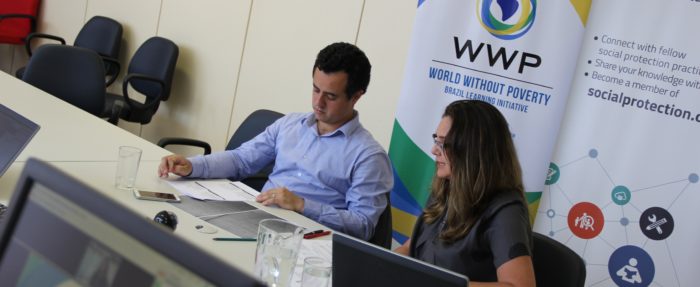
Panelist Vitor Azevedo Pereira (Brazilian Ministry of Social and Agrarian Development) and moderator Cláudia Baddini (World Bank), in Brasilia. Photo: Marco Prates
Program managers in Mexico and Brazil shared the lessons they have learned in creating and institutionalizing social policy Monitoring and Evaluation (M&E) systems. The webinar Design and Implementation of M&E systems: The cases of Brazil and Mexico marked the fourth online seminar in The Brazilian Experience in Social Protection Programs series, led by a partnership between the Brazil Learning Initiative for a World without Poverty (WWP) and the platform socialprotection.org. Check out the recording of the webinar—at the end of this page—and the panelists’ presentations.
The topics addressed included the particulars of the institutional organization, objectives, and challenges involved in each country’s systems, as well as lessons learned along the way.
In Mexico, for example, one lesson pertains to the need to have in place a way for program implementers to replicate initiatives that have already undergone evaluation. According to Thania de la Garza, Deputy General Director of Evaluation at Mexico’s National Council for the Evaluation of Social Development Policy (CONEVAL), “nobody else knows the programs better.”
“The recommendations are non-binding. The implementers are not required to adhere to the evaluators’ recommendations verbatim. What they are required to do is conduct an analysis of the results and decide how feasible it would be to strictly follow them or heed them in some other way,” the General Director said.
In Brazil, one of the challenges is to select which projects will be sent for assessment by the Secretariat for Evaluation and Information Management (SAGI), which works under the auspices of the Ministry of Social and Agrarian Development (MDSA).
“It depends on the strategic importance of the program to the Ministry. For example, right now we are evaluating the Happy Child Program (Programa Criança Feliz), which is big. So it comes down to a mix of factors, like also having people who understand the importance of evaluation in key positions at the Ministry,” explained the Evaluation Director at SAGI, Vítor Azevedo Pereira.
The panelists’ presentations revealed significant differences between how the two Monitoring and Evaluation systems are organized.
“In Mexico, the most important step was the policy decision to set up a broader regulatory framework for the entire government, so that evaluations would become a part of all programs,” summarized the moderator Cláudia Baddini, senior expert in Social Protection at the World Bank.
When they shared their closing remarks, however, it became evident that the panelists face similar challenges, including promoting more widespread use of evaluation by the different actors involved and forging closer ties between the results of evaluations and the planning process.
Video
Meet our panelists
Panelist 1
 Thania de la Garza
Thania de la Garza
Deputy General Director of Evaluation
National Council for the Evaluation of Social Development Policy of Mexico (CONEVAL)
Since 2009, Thania de la Garza has been appointed as Director of Evaluation at CONEVAL, in México. The unit leaded by Mrs. de la Garza aims to regulate and coordinate the evaluation system of social development policy activities (health, education, development, agriculture and rural development, social development, poverty, labor, science, technology) and public programs executed by Mexican federal government. At CONEVAL, she has coordinated over 1,600 evaluations on public policies and programs aligned to social rights. Through the promotion of the use of evaluations, her work has contributed to the improvement of social development policy as well as transparency and accountability. Thania is also part of the faculty in the University Program for Development Studies (PUED) at Universidad Nacional Autónoma de México (UNAM). She has a degree in Economics and a Master´s degree in Public Policy from the Instituto Tecnologico Autonomo de México (ITAM).
Panelist 2
 Vitor Azevedo Pereira
Vitor Azevedo Pereira
Director of Evaluation of the Secretariat of Evaluation and Management of Information (SAGI)
Ministry of Social and Agrarian Development of Brazil (MDSA)
Vitor holds a PhD in Economics from PUC-Rio. He served as a visiting researcher at Stanford University during part of his PhD research. Vitor holds a Master’s degree in Economics from PUC-Rio and University of Maryland, and holds a degree in Economics from PUC-Rio. Prior to his PhD, he worked as a World Bank consultant in education. His research is focused on the economics of education, early childhood development and public policy evaluation. Currently, Vitor is director of the Evaluation department of SAGI, responsible for coordinating evaluations of social policies developed by the Brazilian Ministry of Social and Agrarian Development.